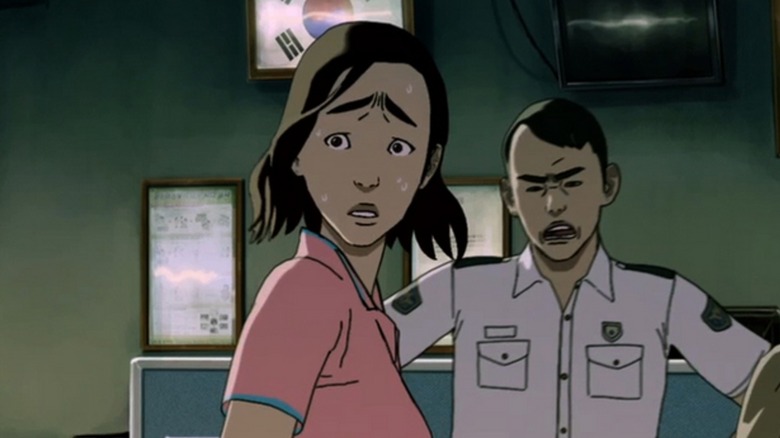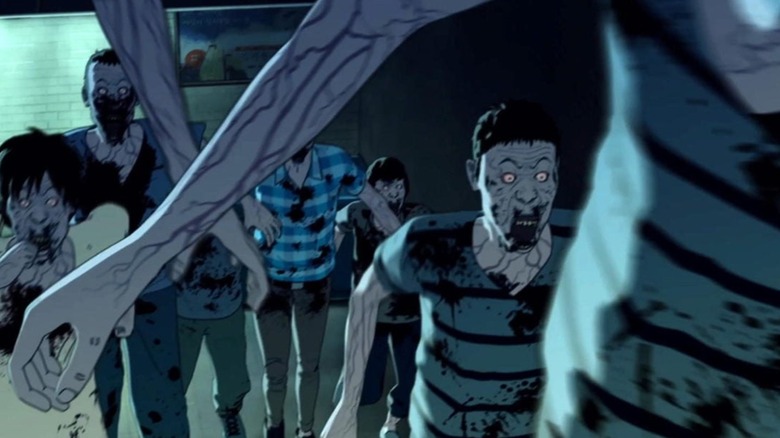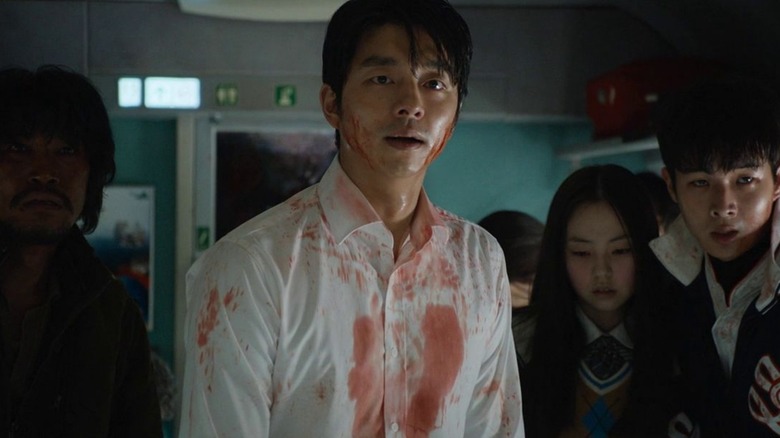The Overlooked Korean Zombie Movie With A Perfect Rotten Tomatoes Score
It's hard to stand out in the zombie genre, which is filled with classics like "The Night of the Living Dead" and beloved long-form series like "The Walking Dead," but when "Train to Busan" debuted in 2016, the film's unique setting and perspective made an impact. Audiences were extremely impressed by the film's "zombies on a train" hook, and just a few months later, the "Train to Busan" prequel earned a perfect Rotten Tomatoes score and became known as one of the best Korean horror movies ever.
"Seoul Station" is an animated film written and directed by Yeon Sang-ho, who also directed "Train to Busan" (written by Park Joo-suk), The prequel follows a different set of characters living in Seoul during the onset of a zombie apocalypse. Ki-woong (Lee Joon) is looking for his girlfriend Hye-sun (Shim Eun-kyung) after the two are separated when zombies begin attacking the titular train station. Ki-woong ends up partnering with Suk-gyu (Ryu Seung-ryong), Hye-sun's father, but neither of them is prepared for the violence that's about to unfold.
Rotten Tomatoes' critic consensus describes the film as "[t]hrilling and relentless from start to finish [...] a layered and vicious entry into the zombie genre." Reviewers praised the film's animation style and commitment to maintaining the gritty, gruesome aesthetic of "Train to Busan." "Seoul Station" is one of the rare films to have a 100% Rotten Tomatoes rating — and it's also one of those uncommon situations where audiences and critics had completely opposite reactions.
Why did audiences rate the movie so low?
"Seoul Station" might have a perfect score with critics, but Rotten Tomatoes audiences gave the movie a dire 39% Popcornmeter rating. Oddly enough, many of the lackluster audience reviews go out of their way to praise the film's animation, but the actual story didn't sit right with them. Part of this is because, despite being a prequel to "Train to Busan," the movie doesn't actually explain how the zombie virus from the original movie came into existence. Maybe that's because zombie franchises never really come up with satisfying answers to that particular question, but some still felt like "Seoul Station" barely connected to the original film they enjoyed.
Other viewers had problems with the new characters introduced in "Seoul Station." Ki-woong and Suk-gyu are both pursuing Hye-sun for their own secret reasons, and neither of the men comes out of the movie looking sympathetic. Some people simply couldn't stand following morally repugnant characters for an entire movie. Critics were apparently much more willing to invest themselves in the deeper themes that "Seoul Station" explores through its characters.
What else is in the Train to Busan franchise?
"Seoul Station" may not have lived up to the expectations of some "Train to Busan" fans, but that really speaks to the quality of the first film. If you watched the animated movie first and found yourself enjoying its gritty perspective of a zombie outbreak in a South Korean metropolis, then it's absolutely worth circling back to the live-action film. After all, the original might not have a perfect Rotten Tomatoes score, but its 95% isn't anything to sneeze at.
For anyone who can't get enough of the "Train to Busan" universe, there's also a live-action sequel called "Peninsula." This movie jumps forward in time and offers a look at what's become of South Korea four years after the start of the zombie outbreak. Rather than following civilians, the movie tells the story of men hired by the Chinese mob to retrieve a truck loaded with $20 million from the overrun country.
It's worth noting "Peninsula" is very different from "Train to Busan" and that with a 55% rating on Rotten Tomatoes, it didn't make nearly as strong of an impression as its predecessors. It might not be one of the best zombie movies of all time, but for fans of the genre or the "Train to Busan" franchise, it's well worth watching — especially because the previously announced American remake has been indefinitely delayed since 2022.


